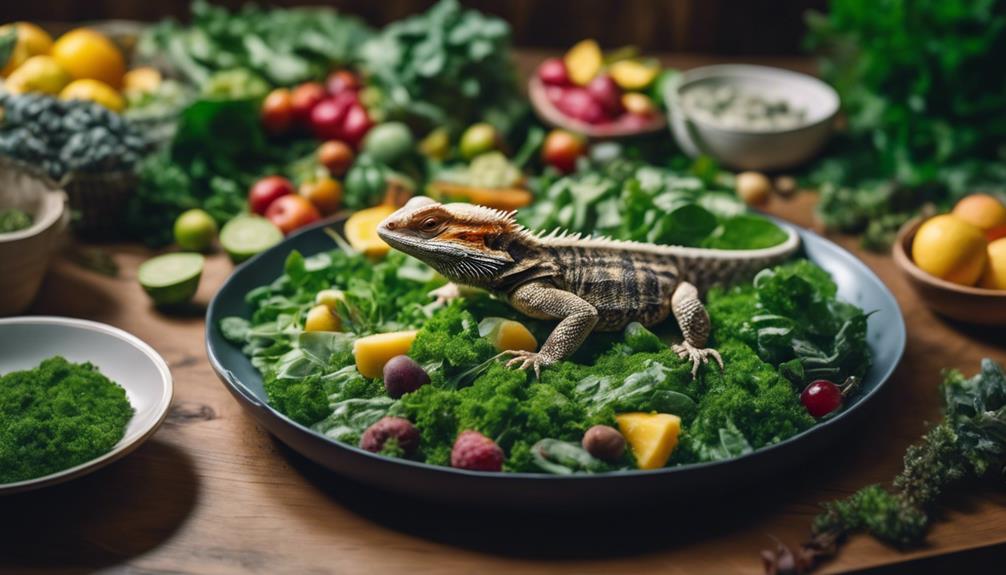A proper bearded dragon diet is about more than just keeping your scaled companion full.
The right mix of insects, plants, and even occasional supplements is vital for their overall health and well-being.
Let’s explore the intricacies of what these fascinating reptiles truly need to thrive.
Introduction
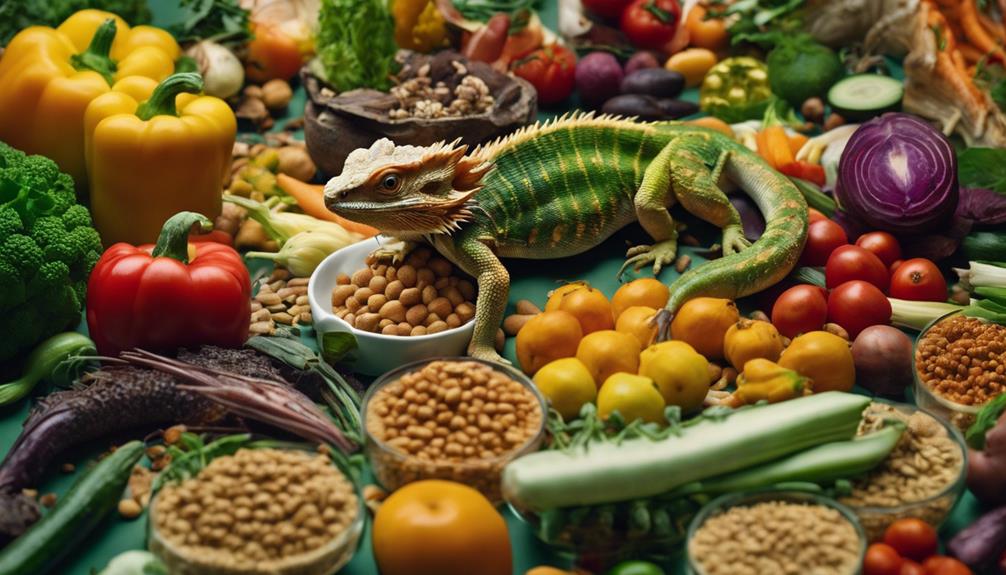
When it comes to the bearded dragon’s diet, understanding their omnivorous nature is important. Proper nutrition is essential for their overall health and well-being, making it essential to provide a balanced mix of insects, vegetables, and fruits.
The importance of a well-rounded diet can’t be overstated in maintaining the vitality of these reptiles.
The Omnivorous Bearded Dragon
Bearded dragons need a mix of bugs and plants to stay healthy and active. As omnivorous creatures, bearded dragons need a balanced diet that includes a variety of insects for protein and essential nutrients, alongside leafy greens and vegetables for vitamins and fiber.
Ensuring your pet’s diet includes a variety of foods is vital to prevent deficiencies like metabolic bone disease. Feeding charts can guide you on the appropriate balance of insects and vegetation for your dragon’s age and size. Dusting their food with calcium powder is also essential to support their bone health.
Importance of a Proper Diet
To understand the best dietary requirements for your bearded dragon, it’s important to recognize how their nutrition directly influences their overall health, development, and longevity. Bearded dragons eat a variety of foods, including fruits, vegetables, and insects, to make sure they receive essential nutrients for the best health.
Providing a healthy and balanced diet is critical for meeting their nutritional needs and supporting their growth. Feeding your pet bearded dragon a diverse range of foods with high nutritional value will help in maintaining a healthy weight and promoting overall well-being.
Care should be taken in feeding practices, ensuring a proper gut load for insects and avoiding substrate contamination to prevent any potential health issues. Feeding your bearded dragon the right foods will help them live a long and happy life.
Age-Specific Diets
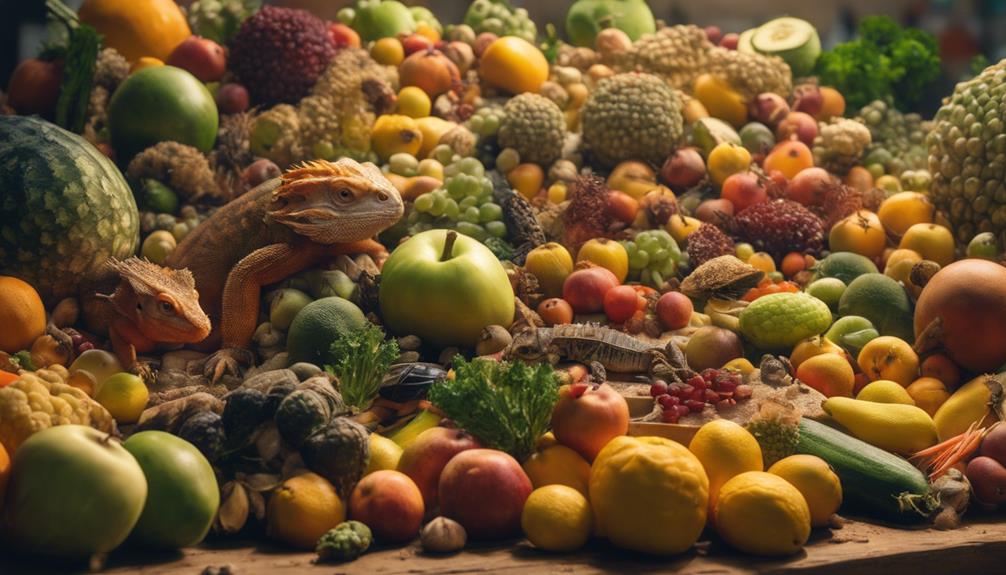
Babies
Baby bearded dragons need frequent feedings due to their rapid growth. Offer small insects multiple times a day, allowing them to eat as much as they can in 10-15 minutes.
What size insects should I feed my baby bearded dragon? Choose insects that are no larger than the space between your baby bearded dragon’s eyes. This helps prevent choking hazards.
As your bearded dragon ages, its dietary needs change to support growth and overall health.
Juveniles (up to 6 months)
For best growth and development, juveniles up to 6 months of age should primarily rely on insects as their main food source. Young bearded dragons require a diet high in protein to support their rapid growth during this important stage.
How often should I feed my juvenile bearded dragon? Offer insects multiple times a day, allowing your juvenile to eat as much as they can within 10-15 minutes. Choose appropriately sized crickets, roaches, and mealworms for safe consumption.
The emphasis on insects guarantees that these juvenile dragons receive the protein needed to build strong muscles and bones. It’s important to offer a variety of insect options to prevent nutritional deficiencies. Providing a balanced diet rich in insects will contribute to the overall health and vitality of your young bearded dragon, setting a solid foundation for their future well-being.
Sub-adults (6-18 months)
As young bearded dragons reach the age of 6-18 months, their dietary needs gradually shift towards a greater emphasis on plant matter while still requiring a substantial intake of insects to support their growth and development.
How do I get my sub-adult bearded dragon to eat their vegetables? Start by offering a variety of leafy greens like collard greens, mustard greens, and dandelion greens, alongside vegetables such as squash, bell peppers, and carrots. Try mixing small amounts of veggies in with their insects, or offering them first thing in the morning when they’re hungriest.
Insects like crickets, dubia roaches, and black soldier fly larvae remain important protein sources during this stage. It’s important to provide a balance between plant matter and insects to make sure they receive the necessary nutrients for their development.
Proper supplementation and gut-loading of insects with nutritious foods are essential to maintain the health of sub-adult dragons during this gradual phase of their diet.
Adults (18+ months)
When developing age-specific diets for adult bearded dragons aged 18 months and older, focus primarily on incorporating a higher proportion of plant-based foods while reducing the number of insects in their daily intake.
How often should I feed insects to my adult bearded dragon? Adult bearded dragons need less protein than juveniles. Offer insects only a few times a week as a supplement to their primarily plant-based diet.
It’s essential to provide a varied selection of greens and vegetables to make sure they receive all the necessary nutrients. Incorporating a range of plant-based foods can help maintain their health and well-being. Remember to offer a balanced mix of these plant-based options to promote the best nutrition for your adult bearded dragon.
Essential Food
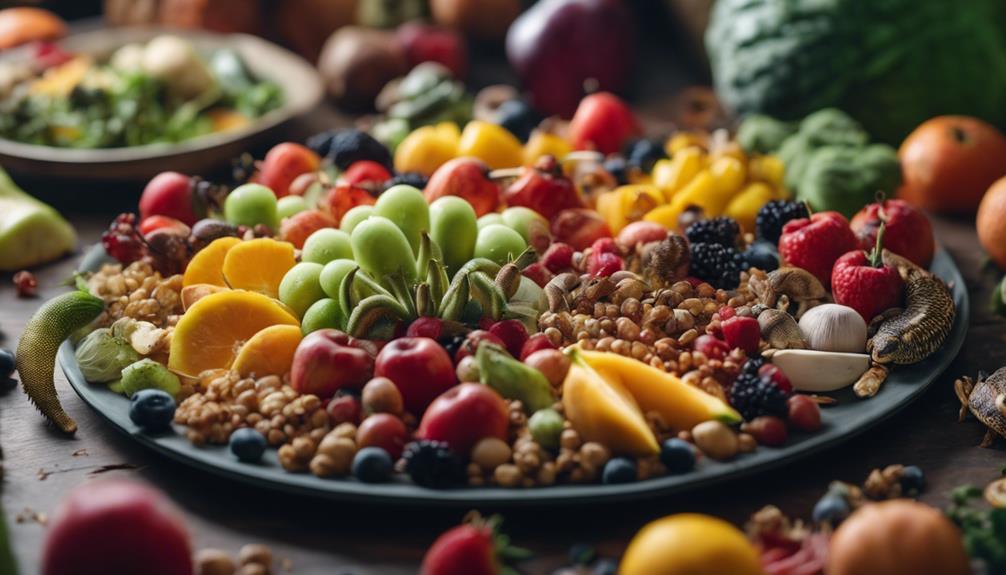
To guarantee the best health of your bearded dragon, it’s vital to provide a diet consisting of a variety of essential food items. These include live insects rich in protein, leafy greens packed with nutrients, a selection of vegetables for fiber, and limited amounts of fruits for additional nutrients.
Insects
In the diet of bearded dragons, insects play an important role as essential food sources, with staple feeders including crickets, dubia roaches, and locusts. When feeding your bearded dragon, remember these key points:
- Gut Load Any Insects: Make sure the insects are well-fed with nutritious foods before offering them to your dragon.
- Feeding Smaller Bearded Dragons: Provide appropriately sized insects to match the size of your dragon, preventing choking hazards.
- Occasionally Varying the Food: Offer a variety of insects to promote nutritional variety and value in their diet.
These live insects are vital for bearded dragons to absorb calcium and other essential nutrients for their overall health and well-being.
Leafy Greens
Incorporating a variety of leafy greens into your bearded dragon’s diet guarantees a well-rounded nutrient intake essential for their overall health and vitality. When selecting leafy greens for your bearded dragon, consider these top choices:
- Collard Greens: Rich in calcium and vitamin A, important for bone health and vision.
- Spring Mix: Offers a mix of different greens, providing a diverse range of nutrients.
- Dandelion Greens: High in fiber and vitamins, aiding digestion and overall health.
Vegetables
Offering a variety of vegetables such as squash, bell peppers, sweet potatoes, and green beans in smaller quantities alongside leafy greens is important to guarantee a balanced diet for your bearded dragon. These veggies supply important fiber and vitamins alongside their staple insect protein source. When planning your bearded dragon’s diet, consider the following:
- Diverse Vegetables: Incorporating a mix of squash, bell peppers, sweet potatoes, and green beans provides essential nutrients and variety to their diet.
- Balanced Intake: Make sure that the vegetables are offered in appropriate portions to maintain a balanced nutritional intake for your pet.
- Consultation: If unsure about the best vegetable options or quantities, seek advice from pet stores or reptile specialists to create a well-rounded diet plan for your bearded dragon’s best nutrition.
Fruits
To ensure a balanced diet for your bearded dragon, it’s important to include fruits in moderation due to their sugar content. Here’s how you can incorporate the fruits you mentioned, with specific serving size suggestions:
Fruits
Fruits should be given as treats and not make up the main portion of the diet because they’re high in sugar. A variety of foods provides the best nutrients for your dragon. Here are the recommended serving sizes for the fruits you’ve selected:
- Berries: A small handful (about 4-5 berries) once a week provides a good source of antioxidants and vitamins without overloading sugar.
- Apples: One or two thin slices or small cubes weekly. Ensure they are peeled and seeds are removed to prevent any risk from cyanide present in the seeds.
- Melon: A small cube (about the size of your dragon’s eye) every other week can offer hydration and a refreshing treat.
Remember to thoroughly wash all fruits and cut them into appropriate sizes to prevent choking. It’s also essential to vary the fruits to provide a range of nutrients and to avoid feeding fruits that are high in oxalates, which can bind to calcium and prevent its absorption.
Incorporate these fruits into your bearded dragon’s diet as occasional treats to add variety and essential nutrients, while ensuring the majority of their diet consists of greens and insects appropriate for their age and size. Always consult with a veterinarian for personalized advice for your pet’s health.
Forbidden Foods
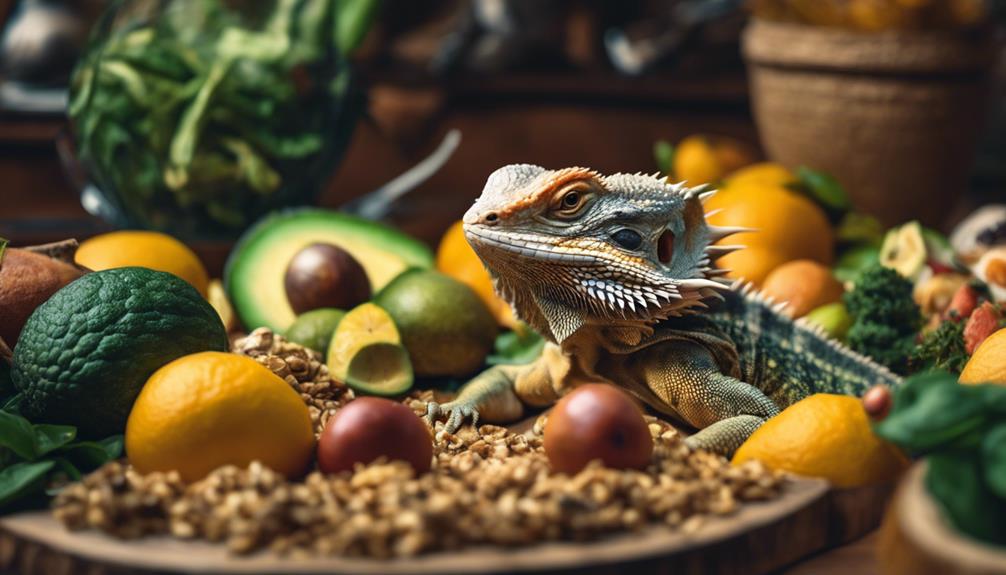
Avoid feeding your bearded dragon citrus fruits, avocado, spinach, beet greens, Swiss chard, wild-caught insects, or any non-approved human foods as they can be harmful to their health. Citrus fruits are too acidic for them, while avocado is toxic. Spinach, beet greens, and Swiss chard contain high oxalate levels that bind calcium, affecting their bone health. Wild-caught insects pose risks of pesticides and parasites. Stick to the safe list of foods to secure your bearded dragon’s well-being.
Can bearded dragons eat any fruits or vegetables? No, many fruits and vegetables are unsafe for bearded dragons. Always research before offering a new food, and stick to a list of approved options.
| Forbidden Foods | Reason | Potential Harm |
|---|---|---|
| Citrus fruits | Acidity can be harmful | Digestive issues |
| Avocado | Contains toxins for dragons | Organ damage |
| Spinach, Beet Greens, Swiss Chard | High oxalate content | Calcium binding, bone issues |
| Wild-caught insects | Pesticides, parasites present | Health complications |
| Non-approved human food | Lack necessary nutrients | Nutritional deficiencies |
Hydration
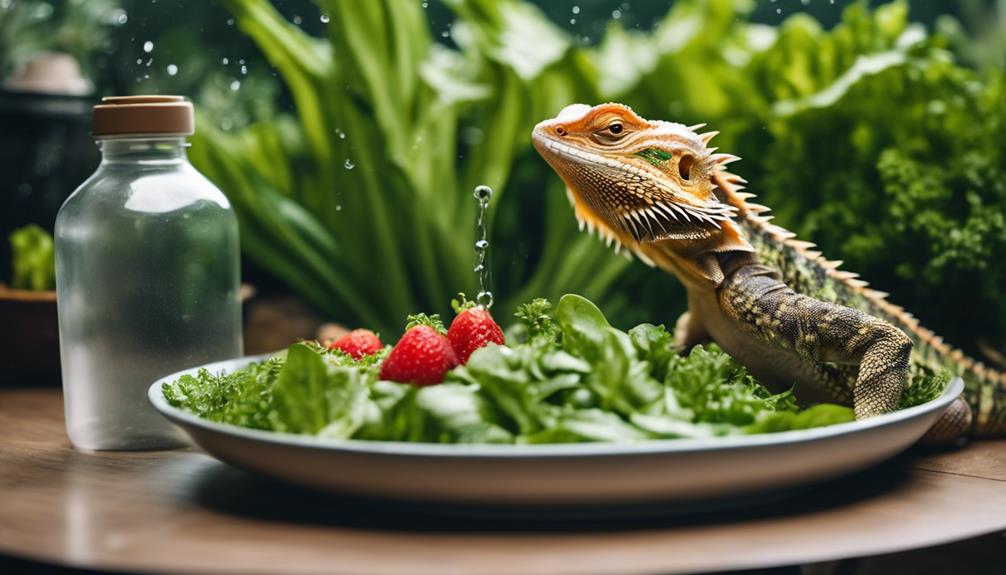
Do bearded dragons drink water from a bowl?
While it’s important to provide a shallow bowl with fresh water, many bearded dragons don’t get enough hydration this way. You can also boost their hydration levels by lightly misting their enclosure and offering occasional baths in lukewarm water.
When considering the best care for your bearded dragon, ensuring proper hydration through misting their enclosure, providing shallow water bowls, and offering occasional baths is important to their overall health and well-being.
Misting the enclosure lightly helps to create a humid environment, aiding in hydration and maintaining the moisture levels needed for your dragon’s well-being. While shallow water bowls with fresh water should be available, many bearded dragons may not drink directly from them. As a result, offering occasional baths in warm water can serve as a hydration aid and also assist in the shedding process, promoting healthy skin for your pet.
Make sure the water temperature for baths is appropriate, not too hot or cold, to prevent stressing your bearded dragon. By incorporating these hydration strategies into their care routine, you can help your dragon stay healthy, hydrated, and comfortable in their environment, supporting their overall well-being.
Supplementation
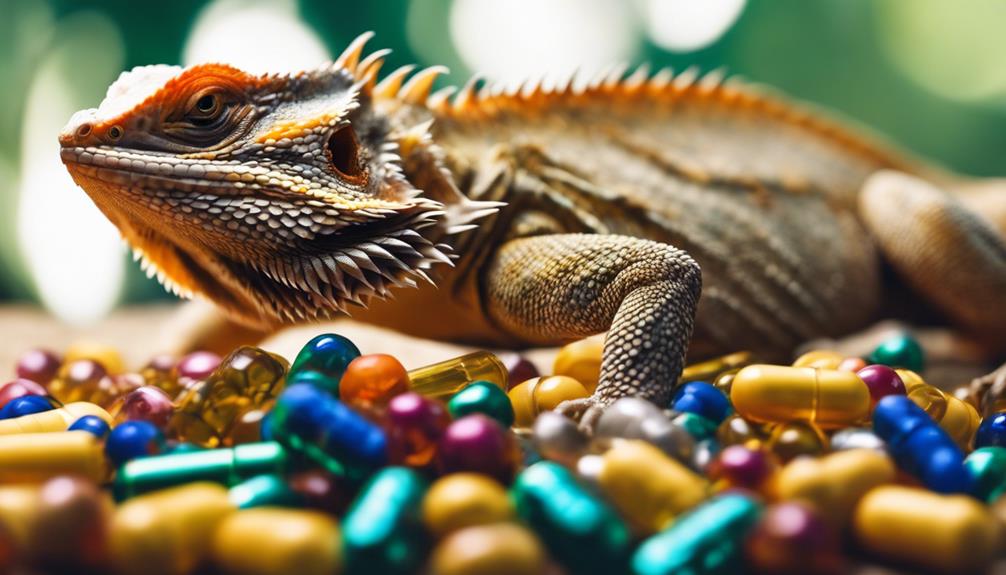
Do bearded dragons need vitamin supplements?
Yes, they need calcium to prevent bone weakness and a multivitamin to ensure they get all the nutrients they need. It’s a good idea to talk to your vet about what supplements are best for your dragon.
When considering supplementation for your bearded dragon, you must prioritize providing adequate calcium and a balanced multivitamin to support their bone development and overall health.
It’s vital to consult with a vet to determine the right supplementation regimen tailored to your dragon’s specific needs.
Ensuring the correct calcium-to-phosphorus ratio and sufficient vitamin D3 intake is essential, especially for young and breeding dragons.
Calcium
To guarantee your bearded dragon’s bone health and prevent metabolic bone disease (MBD), it’s essential to provide proper calcium supplementation in their diet. Calcium plays a critical role in maintaining strong bones and overall health in reptiles. Bearded dragons require a calcium-to-phosphorus ratio of at least 2:1 in their diet to prevent deficiencies.
It’s important to dust their insects with calcium powder before feeding, ensuring they receive an adequate amount. Alongside calcium, exposure to UVB light is essential for calcium absorption. Lack of calcium can lead to soft bones, deformities, and the development of MBD.
Incorporating calcium supplements into your bearded dragon’s diet is essential for their well-being and long-term health.
Multivitamin
Calcium supplementation is essential for your bearded dragon’s overall health, but providing a multivitamin a few times a week can help address any potential nutrient gaps in their diet.
Bearded dragons require a diverse diet to thrive, but even with careful planning, they may still lack some essential nutrients. By incorporating a multivitamin into their feeding routine, you can ensure they receive a more complete array of vitamins and minerals.
This supplementation is particularly important in cases where the diet provided may not cover all their nutritional needs. Choosing a high-quality multivitamin specifically formulated for reptiles is crucial to make sure the content is contextually relevant and beneficial for your bearded dragon’s well-being.
Consultation with a vet
Incorporating a multivitamin into your bearded dragon’s feeding routine can help guarantee they receive a complete array of essential vitamins and minerals, especially when considering a consultation with a vet to address their specific needs.
Bearded dragons have unique nutritional requirements, and a diverse diet is vital to meet these needs. Consulting with a vet (https://arav.org/) can make sure that your dragon’s diet provides the necessary nutritional variety to support their overall health. Vets can recommend specific feeding schedules tailored to your dragon’s age and size, taking into account the balance between insects and plants.
This personalized approach can help prevent nutritional deficiencies, support gut health, and minimize risks such as substrate ingestion. Regular vet consultations are key for preventive care in these diverse ranges of animals.
Feeding Frequency and Portion Sizes
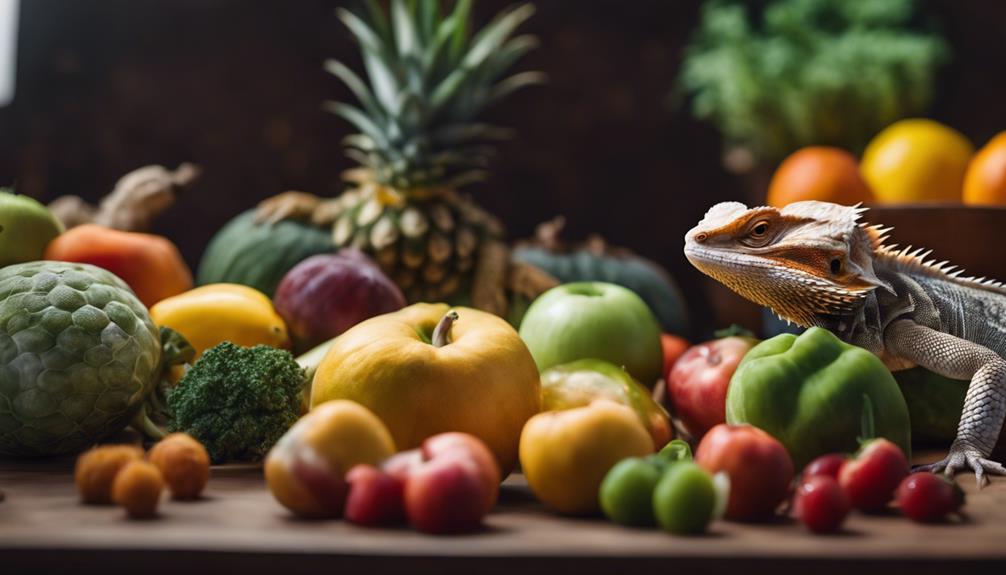
When considering the feeding frequency and portion sizes for your bearded dragon, it’s important to understand the specific needs of juveniles, sub-adults, and adults.
Juveniles will require more frequent feedings of insects to support their rapid growth and development, whereas adults should have a more balanced diet with fewer insect feedings.
How often and how much you feed your bearded dragon depends on their age and overall health. The goal is to give them all the good stuff they need without the risk of them getting overweight!
Juveniles
For juvenile bearded dragons, feeding multiple times a day, allowing them to consume as much as they can within 10-15 minutes, is essential for their growth and development. Juveniles have higher energy requirements due to their rapid growth rate, mimicking their wild counterparts who eat frequently to support their development.
Insects should make up the majority of their diet during this stage to guarantee they receive the necessary proteins and nutrients. Offering a variety of insects such as crickets, roaches, and mealworms can provide a balanced nutrition profile.
It’s critical to monitor their feeding sessions to prevent overeating and to adjust portion sizes accordingly. Providing a well-rounded diet during this critical stage sets the foundation for their future health and well-being.
Sub-adults
To guarantee the peak growth and health of sub-adult bearded dragons, adjust their feeding frequency to every other day with moderate portions.
Sub-adult bearded dragons, in their stage between juveniles and adults, require a balanced diet to support their development. Feeding them every other day helps prevent overeating and ensures they receive adequate nutrition. Moderate portions of insects, vegetables, and fruits help maintain a healthy weight and provide essential nutrients for their growth.
It’s important to establish a consistent feeding schedule to promote proper digestion and overall well-being. By offering the right amount of food regularly, you can contribute to the best health of your sub-adult bearded dragon and support their journey to adulthood through attentive pet care.
Adults
Adult bearded dragons should be fed every other day or two, primarily with vegetation and fewer insects to maintain their health and well-being. Adult dragons benefit from a diet rich in leafy greens, vegetables like squash and bell peppers, and occasional fruits such as berries or melon. Insects like crickets or mealworms should be offered sparingly to prevent obesity and related health issues.
It’s important to provide a balanced diet to avoid nutritional deficiencies and diseases. When purchasing food items, make sure they’re from reputable pet stores to guarantee quality and safety. Proper substrate selection is also important to prevent accidental ingestion and related digestive problems.
Beyond the Basics: Bearded Dragon Diet Tips
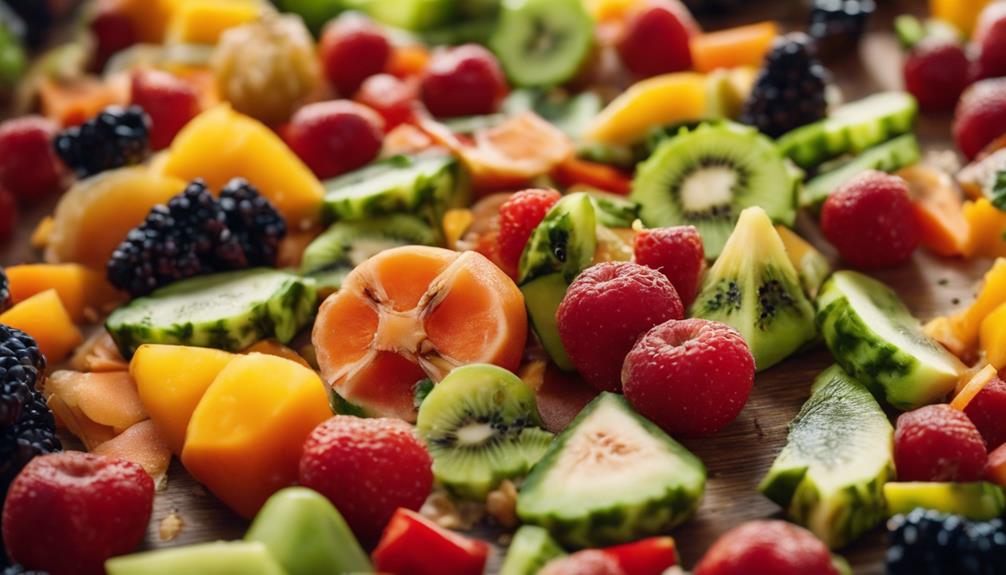
When considering additional considerations for your bearded dragon’s diet, it’s vital to monitor their weight regularly to make sure they’re maintaining a healthy balance.
Sourcing quality food, such as organic fruits and vegetables, can contribute to their overall well-being and longevity.
Monitoring Weight
Regularly monitoring the weight of your bearded dragon is important to prevent obesity and make sure they are receiving the appropriate amount of food. By keeping track of your pet’s weight, you can make necessary dietary adjustments to maintain a healthy weight and prevent potential health issues. Here is a table to help you understand weight monitoring for your bearded dragon:
| Weight Range | Healthy Weight | Action Required |
|---|---|---|
| Below Normal | Adjust food amounts | Increase feeding |
| Normal | Maintain current diet | Continue monitoring |
| Above Normal | Reduce food portions | Consult vet for advice |
Sourcing Quality Food
To guarantee good health for your bearded dragon, sourcing quality food is essential, with a focus on purchasing from reputable suppliers or cultivating your greens for a well-rounded diet. When selecting food sources for your bearded dragon, opt for reputable suppliers known for providing fresh and nutritious options.
Consider growing your greens to make certain a pesticide-free and readily available supply of vegetables for your pet. While pet stores may offer convenience, carefully assess the quality of the products to meet your bearded dragon’s dietary needs adequately.
If You’re looking for care guides on other reptiles? Visit the Freptiles homepage for more resources.
Frequently Asked Questions
What Is the Daily Diet for a Bearded Dragon?
To maintain a healthy bearded dragon, make sure a diet rich in a variety of fruits, veggies, and insects. Consult a vet for personalized advice. Offer insects for up to 10 mins and fruits/veggies for 30 mins daily for best health.
What Can Bearded Dragons Not Eat?
Avoid feeding your bearded dragon avocados, foods high in oxalates like spinach, Swiss chard, and beet greens, wild insects due to pesticides and parasites, citrus fruits, and toxic plants like rhubarb, ivy, and azaleas.
How Often Should You Feed a Bearded Dragon?
You should feed a bearded dragon based on its age, size, and activity level. Monitor their appetite and weight to determine the right feeding schedule. Consulting with a vet for personalized advice is important for the best health.
How Long Can a Bearded Dragon Go Without Eating?
You can go without eating for around 1-2 weeks without significant issues. However, during brumation, you may not eat for several weeks or months. Monitoring your weight and behavior is essential to guarantee your health.
